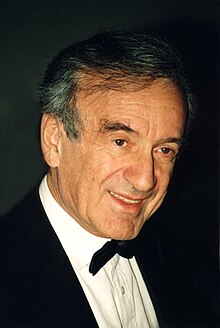
Back Elie Wiesel Afrikaans إيلي فيزيل Arabic ايلى فيزيل ARZ Elie Wiesel AST Eli Vizel Azerbaijani الی ویزل AZB Элі Візель Byelorussian Элі Візэль BE-X-OLD Ели Визел Bulgarian এলি উইজেল Bengali/Bangla
Elie Wiesel | |
|---|---|
 Wiesel in 1996 | |
| Born | Eliezer Wiesel September 30, 1928 Sighet, Kingdom of Romania |
| Died | July 2, 2016 (aged 87) New York City, U.S. |
| Resting place | Sharon Gardens Cemetery, Valhalla, NY, U.S. |
| Occupation |
|
| Citizenship |
|
| Alma mater | University of Paris |
| Subjects |
|
| Notable works | Night (1960) |
| Notable awards |
|
| Spouse |
Marion Erster Rose (m. 1969) |
| Children | Elisha |
Eliezer "Elie" Wiesel (/ˈɛli viːˈzɛl/ EL-ee vee-ZEL or /ˈiːlaɪ ˈviːsəl/ EE-ly VEE-səl;[3][4][5] Yiddish: אליעזר "אלי" װיזל, romanized: Eliezer "Eli" Vizl; September 30, 1928 – July 2, 2016) was a Romanian-born American writer, professor, political activist, Nobel laureate, and Holocaust survivor. He authored 57 books, written mostly in French and English, including Night, a work based on his experiences as a Jewish prisoner in the Auschwitz and Buchenwald concentration camps.[6]
In his political activities Wiesel became a regular speaker on the subject of the Holocaust and remained a strong defender of human rights during his lifetime. He also advocated for many other causes like the state of Israel and against Hamas and victims of oppression including Soviet and Ethiopian Jews, the apartheid in South Africa, the Bosnian genocide, Sudan, the Kurds and the Armenian genocide, Argentina's Desaparecidos or Nicaragua's Miskito people.[7][8]
He was a professor of the humanities at Boston University, which created the Elie Wiesel Center for Jewish Studies in his honor. He was involved with Jewish causes and human rights causes and helped establish the United States Holocaust Memorial Museum in Washington, D.C.
Wiesel was awarded various prestigious awards including the Nobel Peace Prize in 1986.[9][10][11] He was a founding board member of the New York Human Rights Foundation and remained active in it throughout his life.[12][13]
- ^ "Elie Wiesel Timeline and World Events: 1928–1951". encyclopedia.ushmm.org. Archived from the original on March 10, 2023. Retrieved March 10, 2023.
- ^ "Elie Wiesel Timeline and World Events: From 1952". encyclopedia.ushmm.org. Archived from the original on March 10, 2023. Retrieved March 10, 2023.
- ^ "Audio Name Pronunciation | Elie Wiesel". TeachingBooks.net. Archived from the original on August 12, 2022. Retrieved July 3, 2016.
- ^ "NLS Other Writings: Say How, U-X". National Library Service for the Blind and Physically Handicapped (NLS). Library of Congress. Archived from the original on October 30, 2019. Retrieved December 30, 2017.
- ^ "Wiesel, Elie". Longman Dictionary of Contemporary English. Archived from the original on November 16, 2022. Retrieved November 7, 2023.
- ^ "Winfrey selects Wiesel's 'Night' for book club". Associated Press. January 16, 2006. Archived from the original on June 14, 2022. Retrieved May 17, 2011.
- ^ "Elie Wiesel was a witness to evil and a symbol of endurance" Archived January 18, 2017, at the Wayback Machine, US News & World Report, July 3, 2016
- ^ "Remembering Elie Wiesel" Archived July 9, 2016, at the Wayback Machine, Jewish Standard, July 7, 2016
- ^ "The Nobel Peace Prize for 1986: Elie Wiesel". The Nobel Foundation. October 14, 1986. Archived from the original on October 16, 2007. Retrieved May 17, 2011.
- ^ Corinne Segal (July 2, 2016). "Elie Wiesel, Holocaust survivor and Nobel Peace Prize winner, dies at 87". PBS. Archived from the original on August 10, 2023. Retrieved August 8, 2023.
- ^ Carrie Kahn (July 2, 2016). "Elie Wiesel, Holocaust Survivor And Nobel Laureate, Dies At 87". npr. Archived from the original on April 5, 2018. Retrieved August 8, 2023.
- ^ "Elie Wiesl". Human Rights Foundation. Archived from the original on July 25, 2014. Retrieved July 3, 2016.
- ^ "Human Rights Foundation Lauds OAS Discussion on Venezuela". Latin American Herald Tribune. Archived from the original on June 25, 2016. Retrieved July 3, 2016.